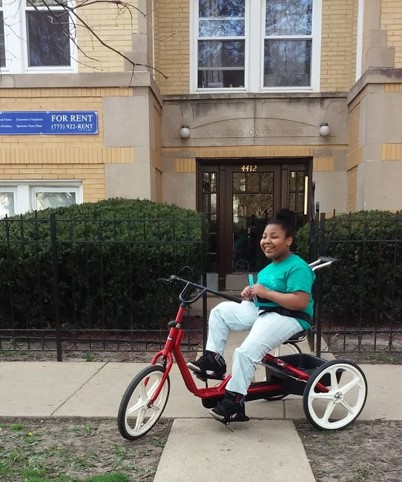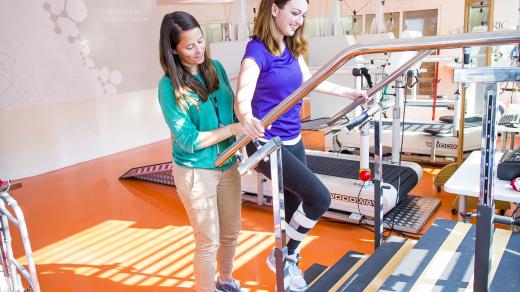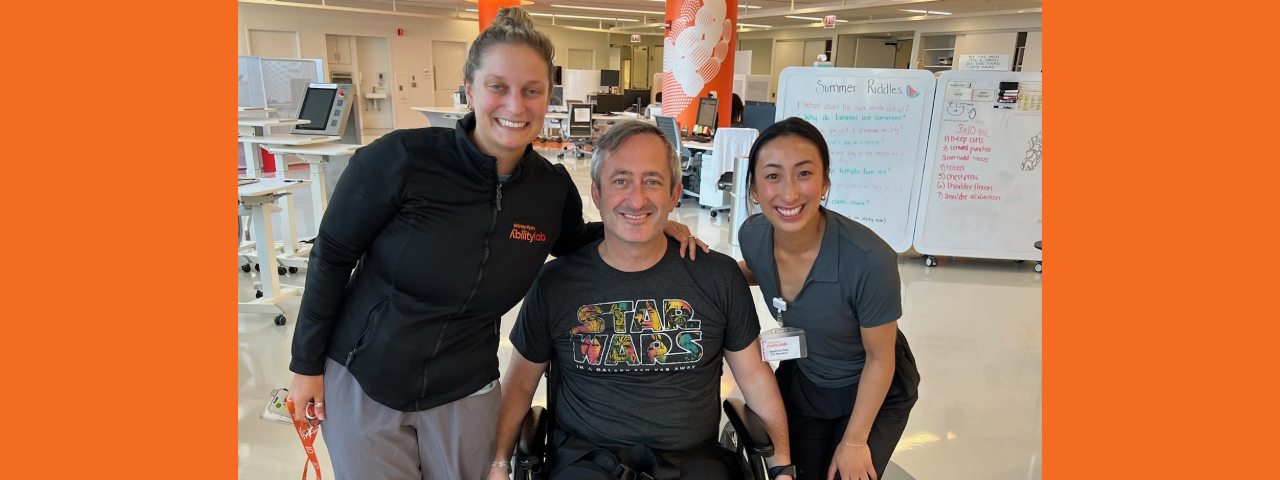Body
In 2010, when Michelle Page began physical therapy through the Rehabilitation Institute of Chicago (RIC) outpatient Pediatric Rehabilitation Program, she was only six. Yet even at such a tender age, she already faced many challenges. Born with cerebral palsy (CP), Michelle used a wheelchair to get around, had trouble with balance and couldn’t walk on her own. She had to be carried up and down stairs, and was weak in both her legs and core. “She couldn’t really do anything,” said Sheanee Page, Michelle’s mom. “She wasn’t standing or walking. She needed assistance to do almost everything, from getting dressed to putting on her shoes.”
Sheanee’s great-aunt, a former RIC patient, was adamant that Michelle would be best served through treatment at the research hospital where she had experienced exceptional care and healing. Since then, over the course of the past six years, Michelle has received intensive physical therapy through RIC’s outpatient, inpatient and DayRehab® programs.
At the onset of treatment, Sheanee had two goals for her daughter. “First, I wanted her to know she was not alone. Second, I wanted her to become more independent. As a parent, my goal was to become more knowledgeable about CP so that I could be that rock for my daughter.”
I owe Michelle’s progress to her hard work and determination to keep pushing, and I owe RIC for showing her how to reclaim her life.
Sheanee Page, Michelle’s Mom
Body
Still working hard in therapy, Michelle is now combating her lower extremity weakness and tightness with a customized therapeutic regimen. Her physical therapy team is leveraging research-based interventions focused on strengthening through functional mobility skills. This treatment plan has included gait training and tasks such as walking with a reverse walker and walking on the treadmill using a body harness for support and safety. Michelle also practices stair climbing, progressing from a set of four steps to an entire flight. Her ability to successfully complete transfers (e.g., from sitting to standing) has vastly improved, as has her ability to stand without the support of a device (or her mom).
Now, at 12, Michelle leads an active life. She is able to walk with her walker, and can walk more than 100 feet with only forearm crutches. With the exception of school field trips, she no longer uses her wheelchair, and she is able to complete transfers without any assistance. She frequently rides her adaptive bike, and recently rode it for 20 blocks while trick-or-treating. “I see more smiles,” said Sheanee. “I see more confidence, and more movement. More life.”
Overall, Michelle’s independence has improved significantly, and she is able to participate in activities with fewer limitations and decreased caregiver dependence. She has dreams of becoming a police officer or chef when she grows up, and likes to bowl, watch movies and ride the bus by herself. Michelle’s family regularly incorporates her therapeutic activities into their everyday routines — a factor contributing greatly to Michelle’s success. Sheanee has advice for other parents in similar situations: “As hard as it may seem, don’t give up; it’s worth the fight.”
Body

Michelle’s current goal in physical therapy is to give up her walker entirely and walk exclusively with crutches. She also hopes to get to the point where she no longer needs to wear braces on her legs (and can have her pick of pretty shoes as a result!).Michelle Page
“I owe Michelle’s progress to her hard work and determination to keep pushing, and I owe RIC for showing her how to reclaim her life,” said Sheanee. “RIC is a place where, even just stepping into the building, you feel safe and secure. You know you’ve come to the right place because you’re surrounded by a team of the best doctors, therapists and social workers who instill a sense of strength and share wide knowledge. I’ve not only seen a change in Michelle with her confidence and independence, but I’ve also seen a change in myself. I know that we can get through anything.”

